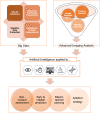Is precision medicine for colorectal liver metastases still a utopia? New perspectives by modern biomarkers, radiomics, and artificial intelligence
- PMID: 35317421
- PMCID: PMC8900542
- DOI: 10.3748/wjg.v28.i6.608
Is precision medicine for colorectal liver metastases still a utopia? New perspectives by modern biomarkers, radiomics, and artificial intelligence
Abstract
The management of patients with liver metastases from colorectal cancer is still debated. Several therapeutic options and treatment strategies are available for an extremely heterogeneous clinical scenario. Adequate prediction of patients' outcomes and of the effectiveness of chemotherapy and loco-regional treatments are crucial to reach a precision medicine approach. This has been an unmet need for a long time, but recent studies have opened new perspectives. New morphological biomarkers have been identified. The dynamic evaluation of the metastases across a time interval, with or without chemotherapy, provided a reliable assessment of the tumor biology. Genetics have been explored and, thanks to their strong association with prognosis, have the potential to drive treatment planning. The liver-tumor interface has been identified as one of the main determinants of tumor progression, and its components, in particular the immune infiltrate, are the focus of major research. Image mining and analyses provided new insights on tumor biology and are expected to have a relevant impact on clinical practice. Artificial intelligence is a further step forward. The present paper depicts the evolution of clinical decision-making for patients affected by colorectal liver metastases, facing modern biomarkers and innovative opportunities that will characterize the evolution of clinical research and practice in the next few years.
Keywords: Artificial Intelligence; Biomarkers; Colorectal liver metastases; Genetics; Immune infiltrate; Radiomics.
©The Author(s) 2022. Published by Baishideng Publishing Group Inc. All rights reserved.
Conflict of interest statement
Conflict-of-interest statement: The authors have no conflicts of interest to disclose.
Figures


Similar articles
-
Artificial intelligence in colorectal cancer liver metastases: From classification to precision medicine.Biosci Trends. 2025 May 9;19(2):150-164. doi: 10.5582/bst.2025.01045. Epub 2025 Apr 15. Biosci Trends. 2025. PMID: 40240167 Review.
-
Artificial intelligence in the diagnosis and management of colorectal cancer liver metastases.World J Gastroenterol. 2022 Jan 7;28(1):108-122. doi: 10.3748/wjg.v28.i1.108. World J Gastroenterol. 2022. PMID: 35125822 Free PMC article. Review.
-
Radiomics: A radiological evidence-based artificial intelligence technique to facilitate personalized precision medicine in hepatocellular carcinoma.Dig Liver Dis. 2023 Jul;55(7):833-847. doi: 10.1016/j.dld.2022.12.015. Epub 2023 Jan 13. Dig Liver Dis. 2023. PMID: 36641292 Review.
-
Colorectal Liver Metastases: Does the Future of Precision Medicine Lie in Genetic Testing?J Gastrointest Surg. 2018 Jul;22(7):1286-1296. doi: 10.1007/s11605-018-3766-1. Epub 2018 Apr 11. J Gastrointest Surg. 2018. PMID: 29644557 Review.
-
Precision surgery for colorectal liver metastases: Opportunities and challenges of omics-based decision making.Eur J Surg Oncol. 2017 May;43(5):875-883. doi: 10.1016/j.ejso.2017.02.014. Epub 2017 Mar 6. Eur J Surg Oncol. 2017. PMID: 28302330 Review.
Cited by
-
Artificial Intelligence to Early Predict Liver Metastases in Patients with Colorectal Cancer: Current Status and Future Prospectives.Life (Basel). 2023 Oct 9;13(10):2027. doi: 10.3390/life13102027. Life (Basel). 2023. PMID: 37895409 Free PMC article. Review.
-
Comparative exploration of the carotid body in domestic animals: morphology, physiology, histology, and pathology.Front Vet Sci. 2024 Nov 22;11:1409701. doi: 10.3389/fvets.2024.1409701. eCollection 2024. Front Vet Sci. 2024. PMID: 39649680 Free PMC article. Review.
-
Robotic versus open resection for colorectal liver metastases in a "referral centre Hub&Spoke learning program". A multicenter propensity score matching analysis of perioperative outcomes.Heliyon. 2024 Jan 17;10(3):e24800. doi: 10.1016/j.heliyon.2024.e24800. eCollection 2024 Feb 15. Heliyon. 2024. PMID: 38322841 Free PMC article.
-
Machine Learning Approaches with Textural Features to Calculate Breast Density on Mammography.Curr Oncol. 2023 Jan 7;30(1):839-853. doi: 10.3390/curroncol30010064. Curr Oncol. 2023. PMID: 36661713 Free PMC article.
-
Colorectal liver metastases patients prognostic assessment: prospects and limits of radiomics and radiogenomics.Infect Agent Cancer. 2023 Mar 16;18(1):18. doi: 10.1186/s13027-023-00495-x. Infect Agent Cancer. 2023. PMID: 36927442 Free PMC article. Review.
References
-
- Van Cutsem E, Cervantes A, Adam R, Sobrero A, Van Krieken JH, Aderka D, Aranda Aguilar E, Bardelli A, Benson A, Bodoky G, Ciardiello F, D'Hoore A, Diaz-Rubio E, Douillard JY, Ducreux M, Falcone A, Grothey A, Gruenberger T, Haustermans K, Heinemann V, Hoff P, Köhne CH, Labianca R, Laurent-Puig P, Ma B, Maughan T, Muro K, Normanno N, Österlund P, Oyen WJ, Papamichael D, Pentheroudakis G, Pfeiffer P, Price TJ, Punt C, Ricke J, Roth A, Salazar R, Scheithauer W, Schmoll HJ, Tabernero J, Taïeb J, Tejpar S, Wasan H, Yoshino T, Zaanan A, Arnold D. ESMO consensus guidelines for the management of patients with metastatic colorectal cancer. Ann Oncol. 2016;27:1386–1422. - PubMed
-
- Petrelli F, Barni S Anti-EGFR agents for liver metastases. Resectability and outcome with anti-EGFR agents in patients with KRAS wild-type colorectal liver-limited metastases: a meta-analysis. Int J Colorectal Dis. 2012;27:997–1004. - PubMed
-
- Viganò L, Ferrero A, Lo Tesoriere R, Capussotti L. Liver surgery for colorectal metastases: results after 10 years of follow-up. Long-term survivors, late recurrences, and prognostic role of morbidity. Ann Surg Oncol. 2008;15:2458–2464. - PubMed
-
- Creasy JM, Sadot E, Koerkamp BG, Chou JF, Gonen M, Kemeny NE, Balachandran VP, Kingham TP, DeMatteo RP, Allen PJ, Blumgart LH, Jarnagin WR, D'Angelica MI. Actual 10-year survival after hepatic resection of colorectal liver metastases: what factors preclude cure? Surgery. 2018;163:1238–1244. - PMC - PubMed
Publication types
MeSH terms
Substances
LinkOut - more resources
Full Text Sources
Medical

